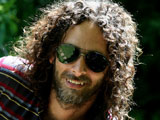Cuban State Security’s First Literary Archive
by Orlando Luis Pardo Lazo and translated by Alex Higson / April 29, 2015 / No comments
Jorge Enrique Lage’s Archivo draws readers into the mysterious world of Cuba’s Ministry of Information with sarcasm and gravity.
Jorge Enrique Lage is the most political member of Cuba’s Lage family. That in itself is no mean feat as for years his uncle, Carlos Lage, was First Deputy Minister of the omnipotent — and despotic — Council of State. The people in the street knew him as “Cuba’s third most powerful man,” after the dinosaur politicians Fidel and Raúl, of course.

- Is it worth-while to focus on the last images and letters coming from the inside of the last living utopia on Earth? Is Cuba by now a contemporary country or just another old-fashioned delusion in the middle of Nowhere-America? A Cold-War Northtalgia maybe? Can we expect a young Rewwwolution.cu within that Ancien Régime still known as The Revolution? I would like to provoke more questions than answers.

- Orlando Luis Pardo Lazo was born in Havana City and still resides and resists there, working as a free-lance writer, photographer and blogger. He is the author of Boring Home (2009) and is the editor of the independent opinion and literary e-zine Voces.
After a video disgraced him and resulted in his ousting from power, Carlos Lage has become the lowest of Cuban citizens. Although he has never officially been charged with anything, he is unable to leave his house without letting the authorities know where he is going, and he has been unable to give even a short press interview. The Cuban people call these Kafkaesque sanctions the “Pajamas Plan.”
However, the Lage legacy is now being defended thanks to the post-generic and perhaps post-generational brilliance of Carlos Lage’s youngest nephew, Jorge Enrique Lage. The young Lage has just had a book of his notes published by Hypermedia, titled almost lazily Archivo (Archive).
For the first time in half a century of Caribbean socialism, an author within Cuba has drawn us into the mysterious world of the Ministry of the Interior with both pop sarcasm and solemn gravity in his message. He leads us through those corridors and characters colored with silence, thus dismantling the fictitious and funerary process of a system that is as repressive as it is rhetorical, a mortal machine that creates conspiratorial scenarios, a Castro plot within it, locked up tight.
This is Archivo: a Cuban book that will not be defined, an object of Lage-scripts in dialogue with Cuba’s undefined. It is also a cultured substitute for the records that I bet the Castroist State Security has had ample time to shred and incinerate. They will not make the same mistake as the Stasi or the KGB: even the island’s memories will be a lie. The book is also a form of literary meddling in the political imagination; those who cling to power in my former country will sooner or later make this uncle’s nephew pay for it. (After having read Archivo I have decided to change my nationality; I now declare myself a citizen of the stateless homeland of Jorge Enrique Lage and his voCUBAlary.)
So what do the dozens of notes in this sort of diary without days mean? I do not know. And the author himself claims not to know either. He writes in small chunks because there is no other way to execute this extreme exercise. And so we hear, as, according to Ricardo Piglia, we have throughout history, the story of a journey or a crime. In this case, the book is about a criminal journey. It is a paranoid parade that shelters the perverse puppeteers of that thing that is still known in Cuba and in North American academic circles – to be fair to the academic-activists of the childish left — as the Revolution in Cuba.
The characters in this book are you and him; the rest are those efficient and ephemeral roles of fiction. To read the book is to put together the shards of reality; to put them together is to dissolve that same reality. And in this lucid and ludic, local and loquacious Archivo, we Cubans finally have a 21st-century literature (and who knows, perhaps even some traces of the 22nd century). Thanks to Jorge Enrique Lage we have a bonus of escaping from the pathetic provincialism of the Cuban literary field, and from the fear of the Castros’, impaling us where it hurts most: as intellectuals, pushing us from mediocrity and meanness to misery.
If you think you have ever read anything about Cuba, you are still lacking as a reader. What you have come across so far is merely Cuba’s posthumous past. Cuban literature begins today, with the grand entrance of Fidel in person, trying to narrate The Horse, making the book forever unpublishable in the nation once known as the “first free land in America.”
Dare to open Archivo at any page and you will be accessing the fossilized future that our precarious present kicks us towards. Share this Lage archive that crosses your own limits, and State Security will very soon thank you for it.





